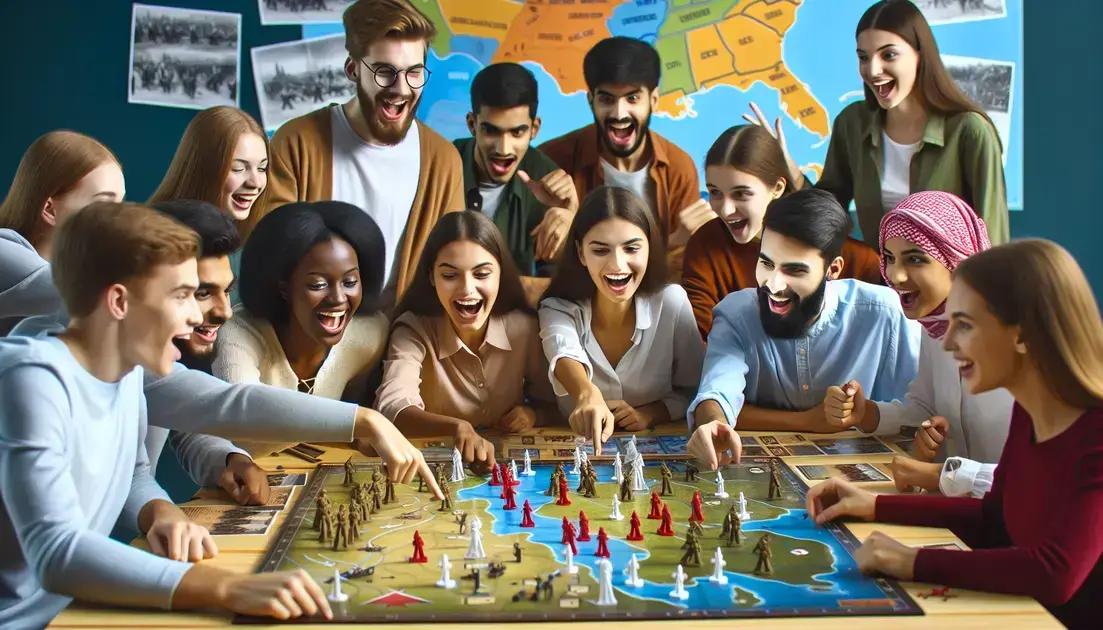Using Axis & Allies for history lessons engages students through strategic gameplay that mirrors World War II events, enhancing understanding of historical facts, critical thinking, and teamwork.
Use Axis and Allies for history lessons is an approach that turns the complexities of World War II into an interactive experience. Ever wondered how a board game could bring history to life and spark curiosity? Let’s dive into making history lessons more gripping through strategic gameplay.
why axis & allies works as a historical teaching tool
Axis & Allies works as a strong historical teaching tool because it immerses students in the strategic decisions and complexities of World War II. This game encourages players to think critically about diplomacy, resource management, and military tactics, reflecting the real-world challenges faced during the war.
Engagement through interactive learning
Unlike traditional textbooks, the game creates an interactive environment where students actively participate in shaping historical outcomes. This hands-on approach enhances memory retention and sparks curiosity about historical events and figures.
Visualizing global conflict
The game board represents a detailed world map with territories and zones of conflict, helping learners visualize the geopolitical landscape of the 1940s. This spatial awareness is crucial for understanding how geography influenced military campaigns and alliances.
Encouraging critical thinking
Players must analyze risks, resources, and alliances carefully, mirroring the decisions political and military leaders had to make. This deepens understanding of cause-and-effect relationships in history.
Promoting teamwork and discussion
Playing in teams fosters collaborative learning and debate, allowing students to discuss and defend their strategies based on historical context.
Overall, Axis & Allies connects theory with practice, making history lessons more dynamic and memorable.
key world war ii events illustrated by the game
Axis & Allies provides a vivid way to explore key World War II events through gameplay. Important battles like the invasion of Poland, the Battle of Stalingrad, and D-Day are reflected in game mechanics and strategies, offering players a chance to understand the significance of these moments.
Invasion of Poland
The game demonstrates how the conflict began with aggressive moves that triggered alliances and war declarations. Players controlling Axis powers plan carefully to expand territory, mirroring real historical advances.
Battle of Stalingrad
This turning point in the war is illustrated by prolonged combat over critical locations. The game encourages players to manage resources and troop movements thoughtfully to replicate the intensity of this battle.
D-Day and Allied offensives
Players engage in strategic amphibious assaults on key provinces, resembling the massive Allied campaign to liberate Europe. This requires coordination and timing, highlighting the complexity of joint operations.
Through these scenarios, Axis & Allies helps make abstract historical events tangible, giving players a deeper appreciation of World War II’s scale and impact.
how to set up axis & allies for classroom use
Setting up Axis & Allies for classroom use requires careful planning to ensure smooth gameplay and maximum learning. First, organize students into teams representing different countries to encourage collaboration and communication.
Prepare materials and space
Ensure you have enough game sets and space for groups to play without distractions. Set up tables with clear access to the game board, pieces, dice, and reference materials such as maps and rulebooks.
Explain the rules clearly
Before starting, review the rules together. Simplify complex parts and use examples to clarify game mechanics. Highlight how the gameplay reflects historical events and strategic decision-making.
Assign roles within teams
Assign specific roles like strategist, resource manager, and spokesperson to help students participate actively and build different skills within their group.
Set clear objectives and time limits
Define learning goals and set realistic time frames for each session to keep the game focused and manageable within class periods.
Regular checkpoints during the game can help monitor progress and facilitate discussions that tie gameplay to history lessons, making the experience both educational and engaging.
engaging students through strategic gameplay

Engaging students through strategic gameplay with Axis & Allies allows them to actively participate in history lessons. This interactive approach makes learning hands-on and fun, which helps maintain interest and improves understanding of complex historical events.
Encourage decision-making
Strategic gameplay encourages students to make thoughtful decisions about troop movements, resources, and alliances. This fosters critical thinking and problem-solving skills as they consider consequences of their actions.
Promote teamwork and communication
Playing in teams requires students to discuss strategies and work together. This builds collaboration skills and helps students learn to articulate historical arguments and strategies clearly.
Use real historical scenarios
By simulating real battles and diplomatic relations, students can experience the pressure and complexity faced by leaders in World War II. This brings history to life beyond just reading facts.
Foster competitive yet respectful learning
Competition adds excitement but also teaches students respect and sportsmanship. It encourages them to analyze both wins and losses for a deeper grasp of history.
Overall, strategic gameplay transforms passive learning into an active, memorable experience.
linking game scenarios to historical facts
Linking game scenarios to historical facts is a crucial part of using Axis & Allies in the classroom. It helps students understand that the gameplay mirrors real events, decisions, and consequences from World War II.
Contextualizing game actions
Each move in the game, from invading territories to forming alliances, reflects specific historical events. Teachers can pause gameplay to explain these moments, connecting strategy with actual timelines and outcomes.
Highlighting cause and effect
Players see firsthand how decisions impact the course of the war. This connection between game choices and historical results builds a deeper understanding of military tactics and political dynamics.
Using primary sources alongside the game
Supplementing gameplay with maps, documents, and photographs helps reinforce the factual basis of the scenarios. This enriches the learning experience by providing multiple perspectives.
Encouraging critical discussion
After each session, students can discuss how history compared to their game experience. This reflection sharpens analytical skills and shows the complexities behind historical narratives.
Overall, linking gameplay to historical facts bridges theory and practice, making history lessons more engaging and educational.
challenges and tips for educators
Educators face unique challenges when using Axis & Allies in history lessons but can overcome them with effective strategies. One common issue is the game’s complexity, which may overwhelm some students at first.
Managing game complexity
Break down the rules into manageable sections and focus on core mechanics before introducing advanced strategies. Using simplified scenarios can help students build confidence.
Time constraints in class
Axis & Allies games can be lengthy. To manage this, set strict time limits or play the game in stages over multiple class sessions, keeping learning goals clear for each phase.
Balancing competitiveness
While competition motivates many students, it can also cause frustration. Encourage teamwork and respect, emphasizing learning over winning to create a positive environment.
Providing historical context
Make sure to connect game events with real history through discussions, supplementary materials, and reflections. This keeps the focus on educational value.
With these tips, educators can turn challenges into opportunities for engaging and effective history lessons using Axis & Allies.
measuring learning outcomes with axis & allies
Measuring learning outcomes with Axis & Allies involves tracking how well students grasp historical concepts and critical thinking skills during gameplay. Teachers can use pre- and post-game assessments to evaluate knowledge gained about World War II events and strategies.
Observation of student participation
Watching how students plan, communicate, and execute strategies gives insight into their understanding of history and teamwork. Active participation often reflects better engagement with the material.
Using reflection and discussion
After gameplay, structured discussions and reflection activities help students articulate what they learned. This technique reinforces knowledge and highlights areas needing clarification.
Quizzes and written assignments
Teachers can create quizzes that align with game scenarios or have students write essays analyzing their gameplay decisions compared to historical outcomes.
Rubrics for assessment
Develop clear rubrics that assess historical accuracy, strategic thinking, and collaboration to provide objective feedback on student performance.
By combining these methods, educators can effectively measure the impact of using Axis & Allies as a tool for history education.
Bringing history to life with Axis & Allies
Using Axis & Allies for history lessons offers a unique and engaging way to help students learn about World War II. Through strategic gameplay, students not only absorb important historical facts but also develop critical thinking and teamwork skills.
By connecting game scenarios to real events and measuring learning outcomes thoughtfully, educators can create memorable and effective lessons. This hands-on experience makes history more dynamic and approachable for all learners.
With careful planning and the right tools, Axis & Allies can transform traditional history classes into exciting opportunities for exploration and discovery.




